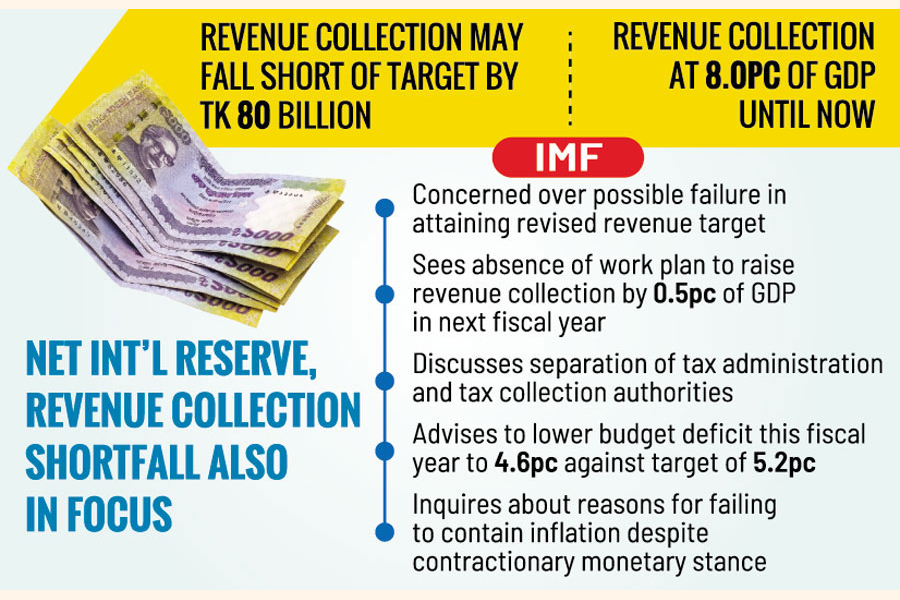
Published :
Updated :

Revenue and forex reserves evoke major concerns as an International Monetary Fund (IMF) delegation starts stocktaking on Bangladesh's achievements against various targets set in a lending package for restoring macroeconomic stability deemed under stress.
The visiting team is reviewing the progresses made so far ahead of releasing the next tranche from a US$4.7 billion worth of loan extended by the Washington-based Fund.
Chris Papageorgiou, Chief of its Development Macroeconomics Division, is heading the IMF mission, which in its debut-day meetings on Wednesday discussed issues like failure in target set for net international reserves and a further flexibility in exchange rate, and expressed concern over shortage in revenue collection against the target, among others.
Sources attending the meetings told the FE the IMF-delegation members also suggested preparing a contractionary budget in the next fiscal year, lowering budget deficit, lessening public expenditure, cut in financial-account deficit, and further lowering of subsidies.
Officials said the team on the day had meetings with the budget and treasury and debt management wings of the finance division where they reviewed current budget-related targets and put forward suggestions in preparation of the next budget.
The team members asked the finance officials whether the revenue -collection target for the current fiscal year could be achieved or not. Sources said the officials indicated that the target may not be achieved and may remain behind by nearly Tk 80 billion or so.
The IMF team was learnt to have aired concern over possible failure in attaining revised revenue target and the absence of any work plan to raise revenue collection by 0.5 per cent of gross domestic production (GDP) in the next fiscal year.
The IMF team also took a close look into Bangladesh's revenue-collection scenario, which remained within 8.0 per cent of GDP until now. The issue of separation of tax administration and tax-collection authority thus also came up for discussion.
The IMF mission, sources said, also suggested further expanding austerity measures to get success in overall fiscal management alongside lessening subsidy "anywhere possible".
In order to make do with resources within reach, the IMF also suggests lowering budget deficit for this fiscal year to 4.6 per cent against the current target of 5.2 per cent and to follow the same for the next fiscal year.
On the day, the IMF team also had parleys with various departments of Bangladesh Bank to get updates on issues like monetary-policy measures, inflation, money supply, exchange rate, interest rate, non-performing loans (NPLs), foreign-currencies reserves, and bank-merger proposals.
According to the meeting sources, the IMF representatives asked the central bank officials to let them know the possible reasons for not being able to contain inflation despite taking a contractionary monetary stance.
And the central bankers attending the meeting explained to the team that "controlling inflation through only interest-rate mechanism is tougher here because of involvement of other non-monetary factors in the supply side".
The banking regulator "is trying its best to bring stability in the commodities' prices to cool down the inflation to a tolerable level," a central banker, who attended the meeting, told the FE, preferring not to be named.
The BB official said, "The IMF team members gave their opinions against continuation of regular liquidity support to the banks by the central bank on a daily basis."
The team suggested streamlining the liquidity supports opening the window once a week. And the bankers updated the team that the Bangladesh Bank had already taken steps to implement it from the next fiscal year.
The IMF officials also wanted to know the regulatory steps in reducing the burden of NPLs in the banking sector and the BB officials concerned shared a recently-circulated roadmap for downsizing burdensome classified loans below 8.0 per cent by June -2026 timeline for the banking industry.
Regarding the recent bank-merger proposals, according to the sources, the IMF team shared their opinions that the central bank should deal with the issue "carefully, not hurriedly".
syful-islam@outlook.com
jubairfe1980@gmail.com


 For all latest news, follow The Financial Express Google News channel.
For all latest news, follow The Financial Express Google News channel.